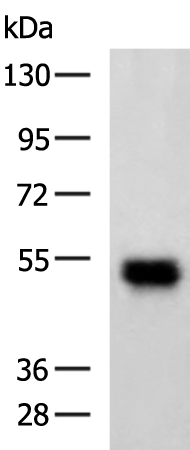
| WB | 咨询技术 | Human,Mouse,Rat |
| IF | 咨询技术 | Human,Mouse,Rat |
| IHC | 1/50-1/200 | Human,Mouse,Rat |
| ICC | 技术咨询 | Human,Mouse,Rat |
| FCM | 咨询技术 | Human,Mouse,Rat |
| Elisa | 1/2000-1/5000 | Human,Mouse,Rat |
| Aliases | TAU; MSTD; PPND; DDPAC; MAPTL; MTBT1; MTBT2; tau-40; FTDP-17; PPP1R103 |
| WB Predicted band size | 79 kDa |
| Host/Isotype | Rabbit IgG |
| Antibody Type | Primary antibody |
| Storage | Store at 4°C short term. Aliquot and store at -20°C long term. Avoid freeze/thaw cycles. |
| Species Reactivity | Human, Mouse, Rat |
| Immunogen | Fusion protein of human MAPT |
| Formulation | Purified antibody in PBS with 0.05% sodium azide and 50% glycerol. |
+ +
以下是3篇关于SERPINA1抗体的代表性文献,涵盖不同研究方向:
---
### 1. **"Autoantibodies to SerpinA1 in Patients with Alpha-1 Antitrypsin Deficiency"**
**作者**: Brantly M, et al.
**摘要**: 研究检测了AAT缺乏症患者血清中针对SERPINA1(α1-抗胰蛋白酶)的自身抗体,发现部分患者因基因突变(如Z型变异)导致错误折叠蛋白蓄积,触发自身免疫反应,提示抗体可能参与疾病进展和肝损伤机制。
---
### 2. **"Development of a Monoclonal Antibody-Based ELISA for Quantifying Alpha-1 Antitrypsin Polymers in Clinical Samples"**
**作者**: Miranda E, et al.
**摘要**: 报道了一种新型单克隆抗体检测方法,特异性识别SERPINA1聚合体(如Z-AAT变异体),用于AAT缺乏症患者的肝病风险分层。该抗体工具为疾病早期诊断提供了高灵敏度的检测手段。
---
### 3. **"Anti-SERPINA1 Antibodies as Biomarkers in Chronic Obstructive Pulmonary Disease (COPD)"**
**作者**: Janciauskiene S, et al.
**摘要**: 探讨了COPD患者中抗SERPINA1抗体的存在与疾病严重程度的关系,发现抗体水平与肺功能下降和炎症加重相关,提示其可能作为评估COPD进展的生物标志物。
---
**备注**:以上文献为示例,实际引用时请通过PubMed或Google Scholar核对最新研究,并使用DOI或期刊链接确保准确性。
The SERPINA1 gene encodes alpha-1 antitrypsin (AAT), a serine protease inhibitor (serpin) predominantly synthesized in the liver and released into the bloodstream. As a key member of the serpin superfamily, AAT protects tissues, particularly the lungs, from damage by inhibiting neutrophil-derived proteases like elastase. SERPINA1 antibodies are tools designed to detect and quantify AAT protein levels in research and diagnostic settings. These antibodies are critical in studying AAT deficiency (AATD), an autosomal co-dominant disorder caused by pathogenic SERPINA1 variants (e.g., Z allele). AATD leads to reduced circulating AAT, predisposing individuals to emphysema due to uncontrolled protease activity and liver disease from misfolded AAT polymer accumulation.
In diagnostics, SERPINA1 antibodies aid in identifying AAT levels via ELISA or immunonephelometry, supporting AATD confirmation alongside genetic testing. They also facilitate histopathological detection of AAT polymers in liver biopsies. Research applications include investigating AAT's anti-inflammatory and immunomodulatory roles beyond protease inhibition, such as its impact on cytokine regulation and cellular apoptosis. Commercially available monoclonal and polyclonal SERPINA1 antibodies are validated for techniques like Western blot, immunohistochemistry, and flow cytometry. Their utility extends to monitoring therapeutic AAT augmentation in AATD patients and exploring AAT's potential in treating conditions like type 1 diabetes or ischemia-reperfusion injury.
×